| « Miss Shevaughn & Yuma Wray Headline Foundations of Music Benefit Concert @ Quenchers on 9/11 | O+ Festival Builds a Positive Community » |
Interview Fri Aug 28 2015
One Question & Endless Responses: A Commentary on Marginalization Within the Music Industry
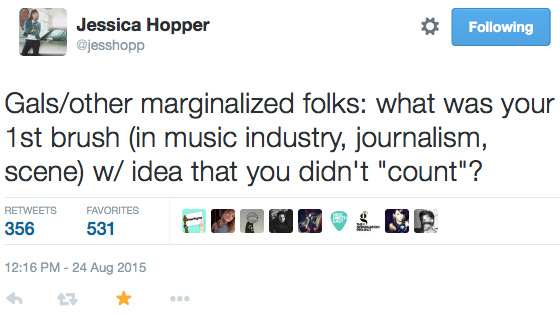
Gals/other marginalized folks: what was your 1st brush (in music industry, journalism, scene) w/ idea that you didn't count'?
So tweeted music journalist Jessica Hopper, curating a conversation that desperately needed to be shared in as well as heard. In the minutes, hours, and days since that tweet on August 24, responses in numerous quantities were conveyed, all by those sharing their distinct experiences with sexism and marginalization within the music industry.
The amount of stories are limitless, spanning decades, and showcasing a patriarchal construct that has been inherently created and reinforced over time within music journalism and the industry as a whole. The conversation's wide scope, emphasized by Hopper's powerful retweets of each response, shed light on the issue for those who were either unaware or ignorant to the situations that befall women and marginalized groups in this industry each and every day. I spoke with Hopper regarding this vital dialogue, how awareness can continue, and steps we can begin to take to ensure that this system changes.
This all too important conversation has ignited a flurry of responses, each desperately needing to be heard. What struck you most about these confessions as a collective, and which specific stories stood out in your mind while reading through? Were you surprised at the volume of responses?
When I was reading it what I was thinking about, as much as the stories I was hearing was the question -- what are the stories we aren't hearing, and from who, and why? I got back-channeled and DMed things that people couldn't share -- sexual assault, rape, cover-ups, horrific stuff and women still at jobs where they had been enduring constant "it's just a joke" sexism for years, women who are at the top of their fields enduring really tremendous hurdles to get to where they were.
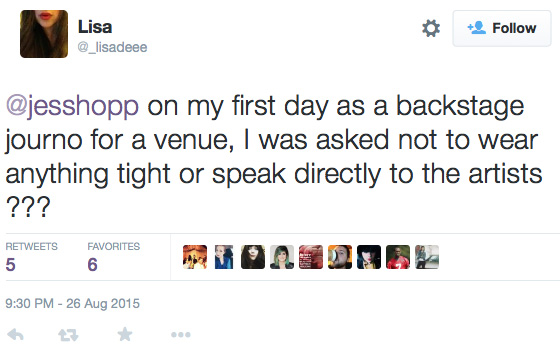
Stories that literally made me sick to my stomach were of several women coming forward to share their brave accounts of rape and sexual assault. In shedding light upon such traumatic and horrifying events, how can this awareness continue a dialogue for both men and women in the music industry?
I mean, continue is hopeful. Start might be a little more realistic. There are organizations in Canada now working with clubs, promoters and festivals on how to prevent and deal with sexual assault in those settings. We need something like that stateside, instead of people throwing up their hands saying, "Well, that's concerts for you" or "That's rock n' roll," rather than being proactive and saying, "How do we make what we are doing safe for everyone?"
I've seen these stories in music journalists' literature repeatedly, in your collected works you just released, through the narratives of friends, you name it. As viewed within these stories as well as the tweets, it happens every day, in infinitely different ways. How can the music industry's patriarchal nature be dismantled once and for all?
I think if I knew how to make that happen, we would. It's symptomatic of culture at large, but also the idea that this is a space for men and women are interlopers.
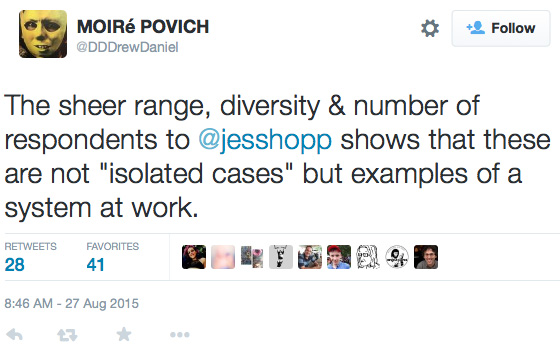
I'm enjoying your next Twitter question posed today, allowing women to celebrate their successes in the music industry. As women in the industry, what can we do to boost each other up and support one another during these tough experiences?
I think we actually need to have men see them, men support them, men call them out. What was happening on Twitter is already extant in real life for these women. Other people need to see, hear and believe, and question themselves, question what goes on around them. Ask why there are not more women, more people of color, et cetera.
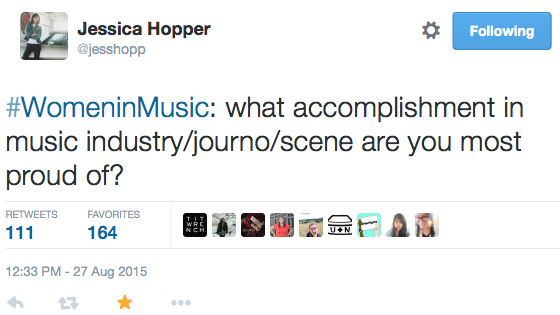
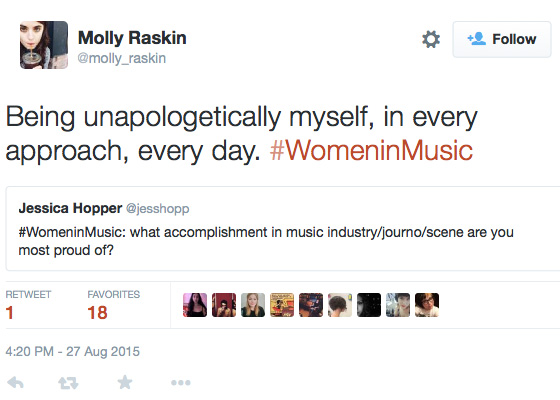
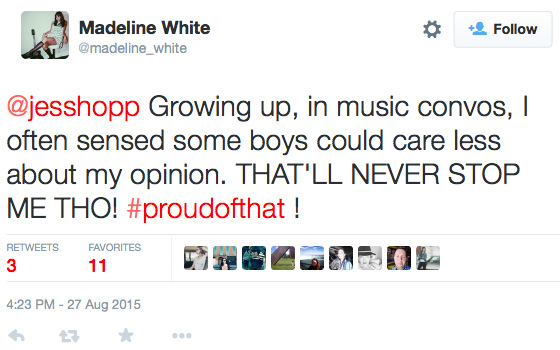
I also spoke with Britt Julious, who joined in the conversation and was open to sharing her own experiences with me. As an accomplished writer and former Gapers Block contributor, Britt currently pens columns for The Chicago Tribune, and contributes pieces for Vice, Noisey and Broadly, among many other outlets. She has a vast amount of experience within Chicago's journalism landscape, and shared her thoughts on this complex issue with me.
This conversation has ignited a huge response, and rightfully so as this is so, so important. Where do you believe this marginalization stems from in the first place?
I think most music scenes are dominated by men. and so because of that, regardless of genre, it becomes the sort of thing where marginalization is inherent and it is more of an issue the more you sort of fall outside of whatever distinct lines exist in terms of the music scene. So if you are interested in rock'n'roll and yet you're a man, but you're a man of color, it might be more of an issue in terms of inclusion, and then it sort of multiplies. For me, when I was growing up and was into punk and the noise scene, being a black woman was like, what are you doing here? It's the sort of thing where I wouldn't say we've necessarily allowed music scenes or music industries to become this very specific culture and very specific group of people, but I do think that it has been that way at least for a long time and we haven't necessarily addressed it.
There have been countless examples shared, but for you personally, what examples of sexism and marginalization have you seen in the local Chicago music community as a whole?
There's definitely a lot of issue in terms of sexism when it comes to the different electronic music scenes, like house and techno. So when I started getting into those kinds of scenes, I initially thought that it would be more welcoming because it wasn't more of the traditional rock'n'roll and punk, those kind of scenes that I had really gotten into when I was in the early stages of my college career. Then I noticed that there were a lot of the same issues, especially when it comes to electronic music. One of the major issues is that you are hearing this music in clubs, in environments where compared to maybe just a bar or performance venue, clubs escalate issues in terms of sexism and between the sexes in terms of any sort of performance venues.
Two and a half years ago I wrote a story for WBEZ about sexual assault and violence in night club spaces and how we don't necessarily talk about them, or if we do talk about them, we're just like, oh, well that's expected. I called out a whole bunch of clubs and basically just said, not like they're these cesspools of these incidences happening, but that we expect it to happen in certain places -- and even in really popular and beloved institutions, like Smart Bar, or Spy Bar, or Primary, I know of women my age, or myself included, who have been sexually assaulted. I published it, and a lot of a women were like oh yeah, I totally agree, that's absolutely true. The owners of Spy Bar were livid, and they were like, "That would never happen at our club, and if it happened at our club, we would know it." And I was like, okay, but it happened to me, so...? The owners, they were confronting me on Twitter, and they were like, "We're going to ask our female bartenders and see if anything happened." They tweeted at their female bartenders saying this hasn't happened here, right? And they were like, um, actually, it happens to me like every weekend, and I don't say anything, because I get tips.
And I was floored that they were actually open to their bosses about that kind of thing too, because they could have absolutely lied and said no, it's totally fine! One of the women, she said, "Yeah, when I was leaving, some guy who had been in the club had cornered me and did all these things." In terms of Chicago, that's sort of the IRL experience that I've had.
That's tough too, that it can happen in a place that you're so comfortable in, that you feel so safe in, that can become one of the most unsafe places for you. Going off of that, I know you travel a lot for interviews. Do you feel that things happen more often in these experiences, where you're maybe not in your comfort zone, or do you feel that these issues happen frequently in any setting?
Honestly, I think it can happen in any setting. For me, I feel like, I'm 27, I've been going out since I was 16, and I've experienced the same kind of stuff regardless of if I'm in a club, if I'm in Chicago, if I'm on the road. I've tried to control the situation as much as possible, so, not drinking, I don't do drugs -- I've never done drugs. If I'm covering something, if I'm doing a concert review or on the road with a musician, I'm like, okay, I'm not going to drink. If you're existing in a culture in which they're allowing you to be preyed upon, it's this imbalanced sexist culture where predators are allowed to do whatever they want to, because that's just how it's ingrained in the system, then it doesn't really matter what you do. After 27 years, I've gotten to the point now where I'm like, anything can happen anywhere, and I have no way of controlling it, basically, and that's just what it's going to be like to be a woman who is also a music writer.
I was talking to the ladies of Celine Neon a few weeks ago. They were mentioning they were playing an all-women show, and that's how it was billed. They were saying I cannot wait until it's not billed as an all-women show, and it's just a show. Even those subtle examples in the headline of a show project these notions. It can't happen overnight at all, because this is so ingrained in society within the music industry, but what do you think are the steps that society needs to take, and that men need to take, as well to be allies and to dissolve these boundaries that have been created?
I guess for society in general it would require more women to be in positions of power. Not just one woman. I think we think, oh we'll have one woman in charge and then everything's going to be perfect, but no, because more often than not, she's still going to be the one woman in a room of a thousand men. Just more women in general, more women who are the inviting other women, or more people from other marginalized groups, whether they're people of color, whether they are part of the LGBTQI community, whether they are women, whatever. Inviting other people, basically, to the table -- I think that's going to be the most critical and key aspect.
In terms of men being allies, I think the most important thing for any ally. Whether it involves sexism in the music industry, whether it involves racism, whether it involves sexuality, allies do the most when they listen, and when they do what they can to amplify the voices of the people who are marginalized. So rather than being like, "I'm going to speak for black people. I'm going to speak for women," what's better is to be like, "Here's this black person, here's this woman, and they have something to say about their experience. You should listen to it, or I'm going to do what I can to make sure you listen to it." That's going to be the most helpful thing.
With Jessica's Twitter project, she did a wonderful job by being this super influential, super respected and high-level music journalist by amplifying the voices of other people. And it wasn't just women's voices that she was amplifying, she was amplifying the voices of people of color, and people in the LGBTQI community, and it was more about being like I'm going to take a step back, and retweet, and allow people to look at my timeline to hear all of these stories. That's going to be the same thing within all different facets of the music industry as well, whether it's record labels, to PR, to performance venues, to journalism, and so on and so forth.
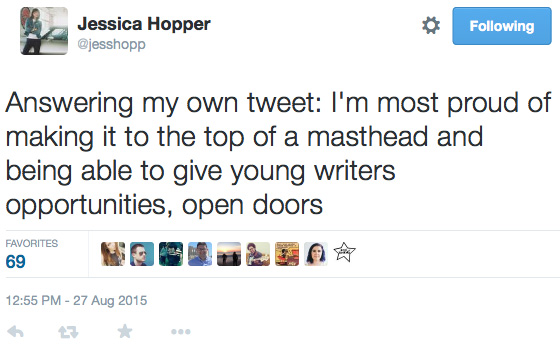
Follow along in the conversation on Jessica's timeline, which now includes a follow-up question, "#WomeninMusic: what accomplishment in music industry/journo/scene are you most proud of?"















